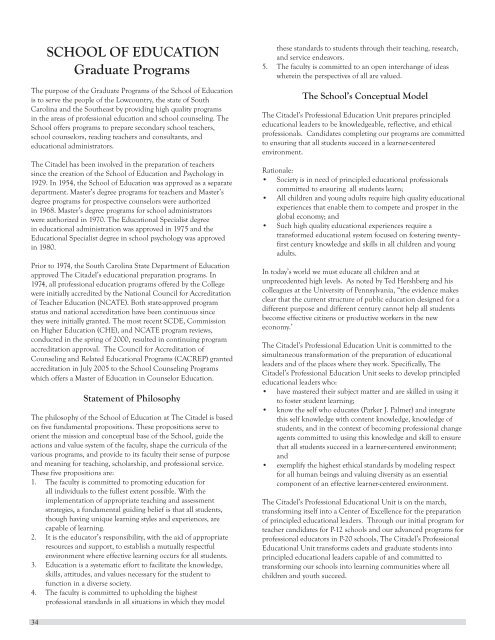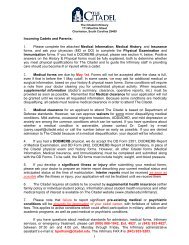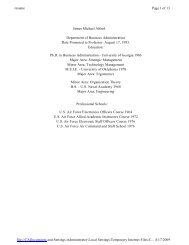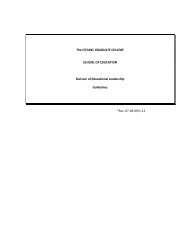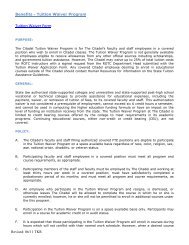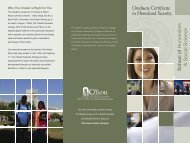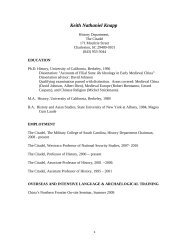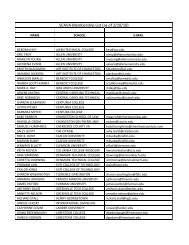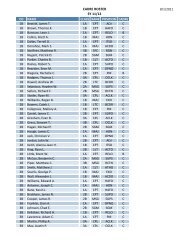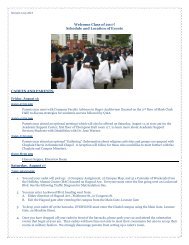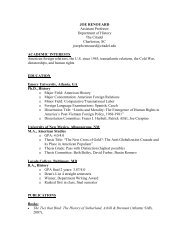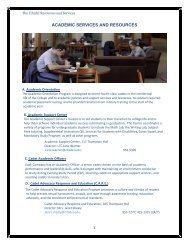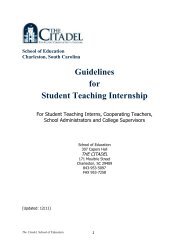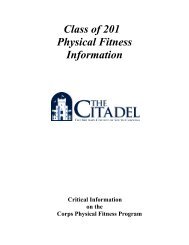2012-2013 CGC Catalog.indd - The Citadel
2012-2013 CGC Catalog.indd - The Citadel
2012-2013 CGC Catalog.indd - The Citadel
Create successful ePaper yourself
Turn your PDF publications into a flip-book with our unique Google optimized e-Paper software.
SCHOOL OF EDUCATION<br />
Graduate Programs<br />
<strong>The</strong> purpose of the Graduate Programs of the School of Education<br />
is to serve the people of the Lowcountry, the state of South<br />
Carolina and the Southeast by providing high quality programs<br />
in the areas of professional education and school counseling. <strong>The</strong><br />
School offers programs to prepare secondary school teachers,<br />
school counselors, reading teachers and consultants, and<br />
educational administrators.<br />
<strong>The</strong> <strong>Citadel</strong> has been involved in the preparation of teachers<br />
since the creation of the School of Education and Psychology in<br />
1929. In 1954, the School of Education was approved as a separate<br />
department. Master’s degree programs for teachers and Master’s<br />
degree programs for prospective counselors were authorized<br />
in 1968. Master’s degree programs for school administrators<br />
were authorized in 1970. <strong>The</strong> Educational Specialist degree<br />
in educational administration was approved in 1975 and the<br />
Educational Specialist degree in school psychology was approved<br />
in 1980.<br />
Prior to 1974, the South Carolina State Department of Education<br />
approved <strong>The</strong> <strong>Citadel</strong>’s educational preparation programs. In<br />
1974, all professional education programs offered by the College<br />
were initially accredited by the National Council for Accreditation<br />
of Teacher Education (NCATE). Both state-approved program<br />
status and national accreditation have been continuous since<br />
they were initially granted. <strong>The</strong> most recent SCDE, Commission<br />
on Higher Education (CHE), and NCATE program reviews,<br />
conducted in the spring of 2000, resulted in continuing program<br />
accreditation approval. <strong>The</strong> Council for Accreditation of<br />
Counseling and Related Educational Programs (CACREP) granted<br />
accreditation in July 2005 to the School Counseling Programs<br />
which offers a Master of Education in Counselor Education.<br />
Statement of Philosophy<br />
<strong>The</strong> philosophy of the School of Education at <strong>The</strong> <strong>Citadel</strong> is based<br />
on five fundamental propositions. <strong>The</strong>se propositions serve to<br />
orient the mission and conceptual base of the School, guide the<br />
actions and value system of the faculty, shape the curricula of the<br />
various programs, and provide to its faculty their sense of purpose<br />
and meaning for teaching, scholarship, and professional service.<br />
<strong>The</strong>se five propositions are:<br />
1. <strong>The</strong> faculty is committed to promoting education for<br />
all individuals to the fullest extent possible. With the<br />
implementation of appropriate teaching and assessment<br />
strategies, a fundamental guiding belief is that all students,<br />
though having unique learning styles and experiences, are<br />
capable of learning.<br />
2. It is the educator’s responsibility, with the aid of appropriate<br />
resources and support, to establish a mutually respectful<br />
environment where effective learning occurs for all students.<br />
3. Education is a systematic effort to facilitate the knowledge,<br />
skills, attitudes, and values necessary for the student to<br />
function in a diverse society.<br />
4. <strong>The</strong> faculty is committed to upholding the highest<br />
professional standards in all situations in which they model<br />
5.<br />
these standards to students through their teaching, research,<br />
and service endeavors.<br />
<strong>The</strong> faculty is committed to an open interchange of ideas<br />
wherein the perspectives of all are valued.<br />
<strong>The</strong> School’s Conceptual Model<br />
<strong>The</strong> <strong>Citadel</strong>’s Professional Education Unit prepares principled<br />
educational leaders to be knowledgeable, reflective, and ethical<br />
professionals. Candidates completing our programs are committed<br />
to ensuring that all students succeed in a learner-centered<br />
environment.<br />
Rationale:<br />
• Society is in need of principled educational professionals<br />
committed to ensuring all students learn;<br />
• All children and young adults require high quality educational<br />
experiences that enable them to compete and prosper in the<br />
global economy; and<br />
• Such high quality educational experiences require a<br />
transformed educational system focused on fostering twenty–<br />
first century knowledge and skills in all children and young<br />
adults.<br />
In today’s world we must educate all children and at<br />
unprecedented high levels. As noted by Ted Hershberg and his<br />
colleagues at the University of Pennsylvania, “the evidence makes<br />
clear that the current structure of public education designed for a<br />
different purpose and different century cannot help all students<br />
become effective citizens or productive workers in the new<br />
economy.’<br />
<strong>The</strong> <strong>Citadel</strong>’s Professional Education Unit is committed to the<br />
simultaneous transformation of the preparation of educational<br />
leaders and of the places where they work. Specifically, <strong>The</strong><br />
<strong>Citadel</strong>’s Professional Education Unit seeks to develop principled<br />
educational leaders who:<br />
• have mastered their subject matter and are skilled in using it<br />
to foster student learning;<br />
• know the self who educates (Parker J. Palmer) and integrate<br />
this self knowledge with content knowledge, knowledge of<br />
students, and in the context of becoming professional change<br />
agents committed to using this knowledge and skill to ensure<br />
that all students succeed in a learner-centered environment;<br />
and<br />
• exemplify the highest ethical standards by modeling respect<br />
for all human beings and valuing diversity as an essential<br />
component of an effective learner-centered environment.<br />
<strong>The</strong> <strong>Citadel</strong>’s Professional Educational Unit is on the march,<br />
transforming itself into a Center of Excellence for the preparation<br />
of principled educational leaders. Through our initial program for<br />
teacher candidates for P-12 schools and our advanced programs for<br />
professional educators in P-20 schools, <strong>The</strong> <strong>Citadel</strong>’s Professional<br />
Educational Unit transforms cadets and graduate students into<br />
principled educational leaders capable of and committed to<br />
transforming our schools into learning communities where all<br />
children and youth succeed.<br />
34


